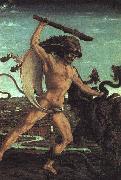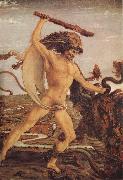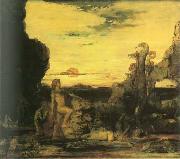Wholesale Oil Painting Reproductions No Minimum and Door to Door! |
|||||||||||
|
|
|||||||||||

|
|||||||||||
|
|
|
||||||||
All Antonio Pollaiuolo Oil Paintings |
||||||||
|
|
||||||||
|
|
||||||||
|
Artist Introduction: 1431-1498 Italian Antonio Pollaiuolo Galleries
Sculptor, painter, designer and engraver. He was trained as a goldsmith and bronze sculptor, probably in Lorenzo Ghiberti workshop. In 1466 he joined the Arte della Seta, the silkworkers guild (to which goldsmiths traditionally belonged), and he listed himself as a goldsmith and painter in the membership records of the Compagnia di S Luca in 1473; this is the only documented reference to him as a painter. In his tax return in 1480 he reported that he was renting a workshop specifically for goldsmiths work. He still described himself as a goldsmith, and not as a painter, in his last tax return in 1496. |
||||||||
|
|
||||||||
|
Hercules and the Hydra Painting ID:: 1587 |
|
|||||||
Height Width |
INS/CM Quality |
|||||||
|
X |
| |||||||
|
|
||||||||
All Antonio del Pollaiuolo Oil Paintings |
||||||||
|
|
||||||||
|
|
||||||||
|
Artist Introduction: b.
1431/32, Firenze, d. 1498, Roma |
||||||||
|
|
||||||||
|
|
Hercules and the Hydra Painting ID:: 44863 |
mk176
c.1460
panel
6.75x4.75in
|
||||||
Height Width |
INS/CM Quality |
|||||||
|
X |
| |||||||
|
|
||||||||
All Gustave Moreau Oil Paintings |
||||||||
|
|
||||||||
|
|
||||||||
|
Artist Introduction: French
1826-1898
Moreau's main focus was the illustration of biblical and mythological figures. As a painter of literary ideas rather than visual images, he appealed to the imaginations of some Symbolist writers and artists, who saw him as a precursor to their movement.
His father, Louis Jean Marie Moreau, was an architect, who recognized his talent. His mother was Adele Pauline des Moutiers. Moreau studied under François-Édouard Picot and became a friend of Th??odore Chass??riau, whose work strongly influenced his own. Moreau carried on a deeply personal 25-year relationship, possibly romantic, with Adelaide-Alexandrine Dureux, a woman whom he drew several times.[1] His first painting was a Piet?? which is now located in the cathedral at Angoul??me. He showed A Scene from the Song of Songs and The Death of Darius in the Salon of 1853. In 1853 he contributed Athenians with the Minotaur and Moses Putting Off his Sandals within Sight of the Promised Land to the Great Exhibition.
Oedipus and the Sphinx, one of his first symbolist paintings, was exhibited at the Salon of 1864. Over his lifetime, he produced over 8,000 paintings, watercolors and drawings, many of which are on display in Paris' Mus??e national Gustave Moreau at 14, rue de la Rochefoucauld (IXe arrondissement). The museum is in his former workshop, and was opened to the public in 1903. Andr?? Breton famously used to "haunt" the museum and regarded Moreau as a precursor to Surrealism.
He had become a professor at Paris' École des Beaux-Arts in 1891 and counted among his many students the fauvist painters, Henri Matisse and Georges Rouault.
Moreau is buried in Paris' Cimeti??re de Montmartre.
In Alan Moore's graphic novel, The League of Extraordinary Gentlemen, it is implied that he was a nephew of Doctor Moreau, and he based a few of his paintings on the Doctor's creations. |
||||||||
|
|
||||||||
|
|
Hercules and the Hydra Painting ID:: 97914 |
circa 1870(1870)
Medium oil on canvas
Dimensions 142 x 168 cm
cyf |
||||||
Height Width |
INS/CM Quality |
|||||||
|
X |
| |||||||
|
|
||||||||
|
Prev Next
|
||||||||
|
|
||||||||
|
Related Paintings to Gustave Moreau :. |
||||||||
|
|
||||||||
|
CONTACT US |



